Scissors for cutting polypropylene pipes: species overview + instructions for use
Polypropylene - a material that has reached the first position in modern plumbing. Polypropylene now produces many plumbing fittings, including pipes and fittings. In this regard, logical questions arise. For example, what tool to cut PP pipes?
We will talk about how best to cut polymer blanks for pipeline assembly. The article we presented describes in detail how to use scissors for cutting polypropylene pipes in practice. Our recommendations will help you to perfectly cut pipes with different diameters and wall thicknesses.
The content of the article:
Overview of polypropylene pipe cutters
Before starting the review, it’s worth clarifying: with scissors, you can cut pipes of small diameters (usually 15-32 mm). Scissors are usually included in the category of hand tools.
For cutting products of large diameters (32 mm or more), pipe cutters are already used. There are manual and electric pipe cutters.
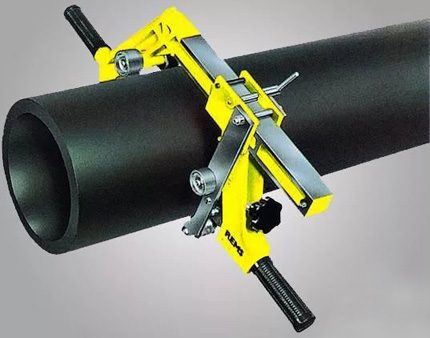
Household cutting tools used in piping assembly heating systems and water supply in country houses. They will be needed in carrying out repairs and modernization of existing circuits in city apartments.
Cutters will be needed for craftsmen making interesting crafts from PP pipescollecting greenhouses and landscaping sites.
The entire cutting tool is conditionally divided by type, depending on its design:
- scissors;
- telescopes;
- guillotines.
Scissor cutters are precision hand tools. The characteristic "precision" literally means exact. Indeed, precision scissors give precise, even cuts thanks to the sharp steel blade.
As a rule, such structures are built on the basis of a ratchet mechanism, which allows you to operate with one hand without much effort. The lack of scissors is the blade travel at a certain angle relative to the pipe surface and the ovality defect is obtained.
The telescopic tool is structurally made in the form of a bracket, on the front side of which there are 1 or 2 pairs of metal rollers.
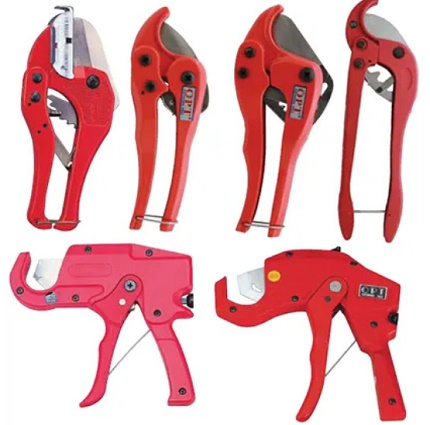
On the rear side of the bracket there is a cutting disc mounted on a movable rod. A plastic pipe is inserted between the rollers and the disk cutter, after which cutting is performed by smoothly supporting the torch and turning the tool around the axis of the pipe.
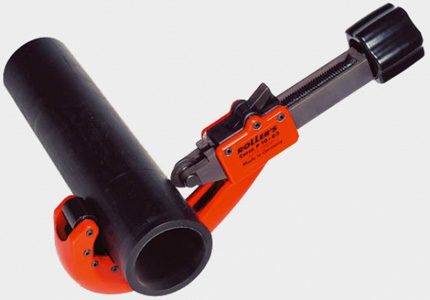
Guillotine models are structurally reminiscent of scissors, but in this case, a distinctive feature is the exclusively direct step feed of the wedge knife to the pipe body.
There is a uniform load distribution, which gives a better cut (eliminates the ovality defect after cutting).
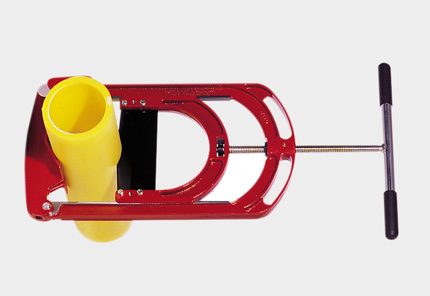
There are manual and automatic guillotine models, for example, operating from a small-sized engine with battery power.
Decide on best pipe cutter model For cutting a polymer pipe, the helpful tips outlined in our recommended article will help.
Examples of pipe cutter models
The pipe cutter brand is selected based on the purpose and technical characteristics. Sometimes in selection cutting tool focus on their own experience and sympathy for the products of a particular company.
VALTEC
Among the rich variety of cutting tools can be distinguished products of the Italian company Valtec, in particular, the model VT m.397.
Pipe cutter of metal-plastic and polymer pipes with a diameter of up to 32 mm is available for manual use. Provides high quality cutting at right angles through the guillotine mechanism.
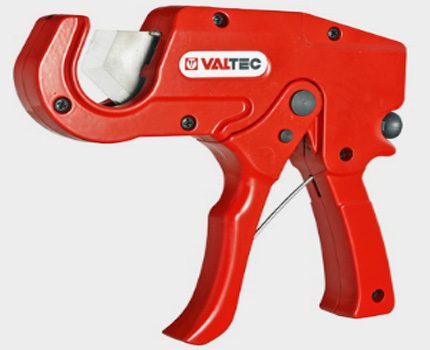
The tool is designed to work with pipes made of polyethylene (including the PEX and PERT series), polypropylene, polybutene, metal polymer.
I-tech
Another quite successful example of a pipe cutter (primarily in terms of price) is a product under the brand name “I-TECH”. Chinese telescopic cutter, which is available for processing polypropylene plastic pipes up to a diameter of 63 mm. By the way, the same company produces scissors for cutting small plastic pipes.
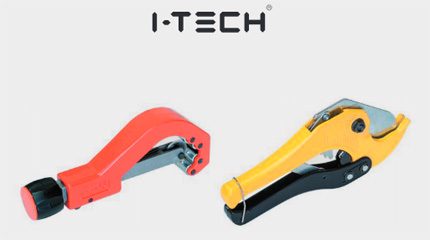
The design of the I-TECH telescope is equipped with a thin sharp disk cutter made of alloy steel. With moderate productivity, the torch will have a lifespan of at least 3 years.
KRAFTOOL
Polypropylene scissors from the German company KRAFTOOL, but in Chinese design, are sold on the market under the EXPERT brand. They allow cutting sleeves up to a diameter of 42 mm.
The cutter is made of alloy steel. Duralumin-based scissors body, which explains the light weight of the tool and a fairly high strength.
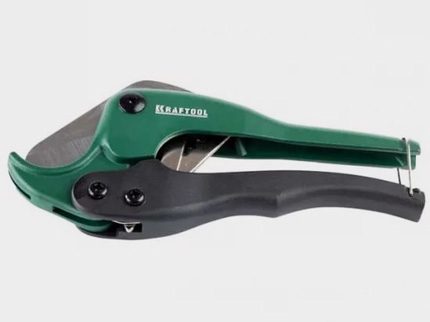
The perfect ratchet mechanism provides ease of use and requires little physical effort from the user.
MILWAUKEE
Cordless pipe cutters are rapidly gaining popularity. As an example of such a technique, the product MILWAUKEE C12 PPC-0 from American manufacturers can be noted.
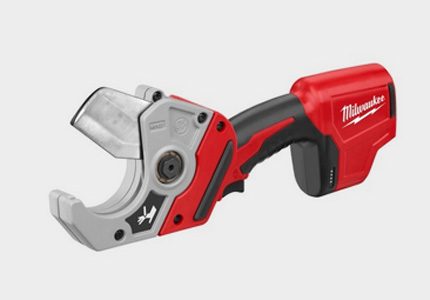
Automatic scissors work with PEX plastic pipes with a diameter of 12-50 mm. The energy source is a 12-volt battery, which allows up to 200 cuts to be performed on a single charge.
You will find valuable tips on choosing the optimal pipe cutter for polypropylene pipes. in the next article, the contents of which we advise you to read.
Plastic Pipe Cutting Machines
Professional activity, where work with polypropylene pipes is carried out, involves the use of machine tools. Such equipment is mainly intended for cutting large diameter plastic pipes from 63 to 1600 mm. Machines not only help to perform cutting, but also allow you to do it from various angles.
Pipe cutters BADA
From specific examples of machine tool equipment, we can note, for example, BADA band saws:
- SJC 315;
- SYH 500;
- SJC 1600.
Model 315 works with products with a diameter of up to 315 mm, cuts workpieces at almost any desired angle (0 - 67.5º). With specifics cutting pipes at an angle with the help of a hand tool will familiarize you with the article that we recommend reading.
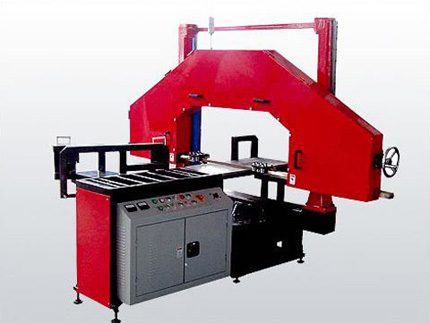
Among other things, such scissors for cutting plastic pipes are also available for processing tees, crosses, bends, etc.
Band saws SYH 500 and SJC 1600
The SYH 500 band saw allows you to work with pipes with a diameter of 63 to 500 mm, process the bases and cut at angles at a speed of 0 to 250 m / min. The SJC 1600 model cuts sleeves up to a diameter of 1600 mm at different angles (0-67.5º) at speeds up to 250 m / min.
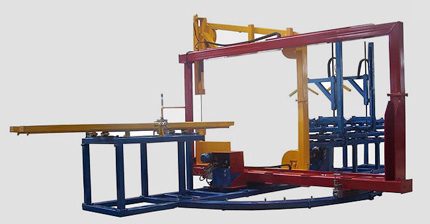
Equipment for professional use - working with plastic pipes - refers to a stationary type of device. Technique requires, as a rule, power from a three-phase network (380 V).
The weight of the machines reaches several tons, and they are structurally composed of several separate modules. The processing functionality of BADA band saws is not limited to just cutting.
Exact PipeCut P400 Pipe Cutter
Something similar, but significantly lightweight and not so overall, did the Finnish manufacturers, giving the name of their own invention - Exact PipeCut P400. As the name of the machine implies, it is able to cut a pipe from plastic of any kind to a diameter of 400 mm and does it in one pass.
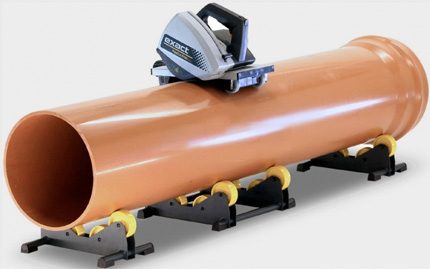
In addition to cutting Exact PipeCut P400, as a separate function, chamfering is supported at an angle of 3.9º - 15.7º. The kit includes two supports for installing pipes - single and double. The Finnish machine may well be used in the domestic sphere, as it operates from a 220 V network, and its weight is only 6 kg.
Polymer pipe cutters: instructions for use
Of course, the scissors for cutting plastic pipes, depending on the design features, have their own instructions. Regardless of the type of tool and working conditions, it is recommended that you follow the instructions exactly. This approach will protect the user from industrial accidents and help to withstand the life of the tool.
You should always remember: instructions are written in order to convey to the user all the subtleties of working with the tool.
How to use a pipe cutter with rollers?
The user manual for the pipe cutter with rollers usually mentions the following sequence of actions:
- Using a marker, mark the cut line on the surface of the pipe.
- Unscrew the stop screw to the point where the pipe freely enters the yaw of the bracket.
- Press the stop screw clockwise to press the disc mechanism with a slight force to the pipe wall.
- Rotate the torch around the pipe axis 360º (you can repeat the operation).
Then repeat steps 3 and 4 until the pipe is completely cut off.
It should be emphasized: the torch disk must not be pressed excessively against the pipe. Such an action can cause the effect of microcracks at the cutting point, which will negatively affect the quality of work.
The nuances of using scissors for PP pipes
The manual pipe cutter manual mentions the following actions by the user:
- Mark the cut line on the pipe with a marker.
- Place the blade base of the scissors on the marked line.
- Check the accuracy of the blade installation through a special slot.
- With little effort, gently squeeze the tool handles.
Approximately in the same way, cutting is performed using guillotine shears, with the only difference being that in this case, the handle of the tool must be squeezed several times in order to achieve complete cutting.
Plus, the guillotine design has a cutter blade return mechanism. Therefore, before each new use, by pressing the return button, the cutter is set to its original state. Typically, after 450-500 cuts, maintenance should be performed.
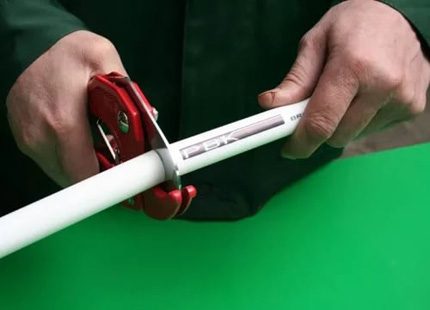
MOT consists in actions aimed at cleaning and lubricating all working parts of the mechanism. The tool body is carefully opened, cleaned and lubricated by friction parts with machine oil.
According to the instructions, the instrument should be stored in the packaging in which it was purchased. It is forbidden to use a pipe cutter to work with pipes made of materials other than polymeric ones.
If the time has come to replace the knife on the guillotine, it must be dismantled, sharpened or replaced.
The procedure for removing the blade is as follows:
- Set the knife in a position where the fastening screw heads are visible in the holes on the body.
- Loosen the fastening screws with a Phillips screwdriver.
- Remove blade from holder body.
Set the sharpened or new cutting element in the reverse order.
Other requirements of instructions
Actual for persons using cutting tools for domestic purposes. Each instruction contains information warning that work on cutting polypropylene pipes manually and using cutters is a full-fledged plumbing work.
In fact, work with pipe cutters of different types should be performed only by qualified personnel (at least a 4-5 grade plumber) trained, with the appropriate certificates.
Instrument actions performed by unqualified persons without permits and certificates may result in an accident and damage to the instrument. Therefore, in such cases, manufacturers of cutters relieve themselves of any responsibility and do not leave any chances for damages.
How to pick up plastic pipe cutting tool, you will learn from an article on this important issue.
Conclusions and useful video on the topic
A few tips on choosing scissors - in the next video:
Pipe cutters of polymer pipes are useful and popular tools designed to greatly facilitate plumbing installation work. Due to the variety of designs and models, it became possible to process pipes of different diameters with any wall thickness.
Scissors and cutters easily cut not only ordinary pipes, but also metal-plastic products. It is impossible to overestimate the need for such an instrument.
Tell us about how you personally cut plastic pipes. Share technological subtleties with site visitors that will be useful in carrying out this work. Please leave comments in the block below, post a photo on the topic, ask questions.

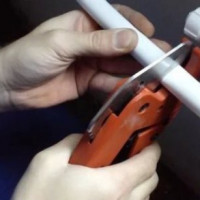 Pipe cutter for polypropylene pipes: an overview of the types of tools and features of working with it
Pipe cutter for polypropylene pipes: an overview of the types of tools and features of working with it 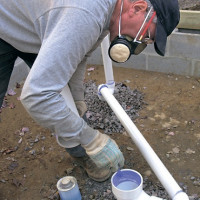 Glue for PVC pipes: an overview of the best compositions and instructions for use
Glue for PVC pipes: an overview of the best compositions and instructions for use 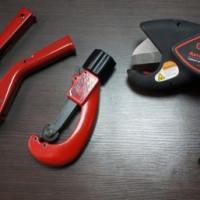 Pipe cutter for plastic pipes: choose the best model + instruction for use
Pipe cutter for plastic pipes: choose the best model + instruction for use 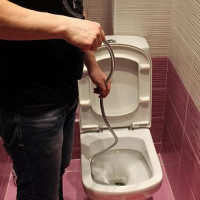 A cable for cleaning pipes: types, how to choose the right + instructions for use
A cable for cleaning pipes: types, how to choose the right + instructions for use 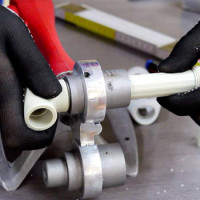 How to choose an iron for welding polypropylene pipes and how to use it correctly
How to choose an iron for welding polypropylene pipes and how to use it correctly 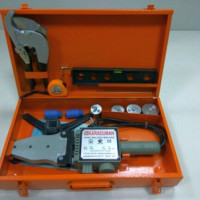 How to choose a soldering iron for polypropylene pipes: tips from professional plumbers
How to choose a soldering iron for polypropylene pipes: tips from professional plumbers 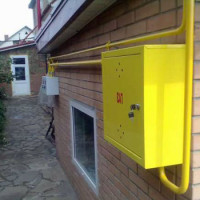 How much does it cost to connect gas to a private house: the price of organizing gas supply
How much does it cost to connect gas to a private house: the price of organizing gas supply  The best washing machines with dryer: model rating and customer tips
The best washing machines with dryer: model rating and customer tips  What is the color temperature of light and the nuances of choosing the temperature of the lamps to suit your needs
What is the color temperature of light and the nuances of choosing the temperature of the lamps to suit your needs  Replacement of a geyser in an apartment: replacement paperwork + basic norms and requirements
Replacement of a geyser in an apartment: replacement paperwork + basic norms and requirements
I have already killed about 8 scissors for my practice. And not because I'm crooked, or I’m buying completely scissors. At first he took the expensive ones, so they also break down, like the ones that are now - a year or two and for discharge. Now I take Turkish, they normally withstand the deadline. I work with small diameters, up to a maximum of 40mm, so all of these machines are unnecessary to me, and there are extra costs.
For a long time, I generally managed with the usual hacksaw. If the pipe is narrow, it is easy to make an even cut, and sand the frayed edges.
When I began to work with thicker pipes, I bought cutters. Not everything is smooth with them, some do not master the declared diameter and begin to mow, and fail in a few months.Have to go broke on I-TECH or KRAFTOOL.